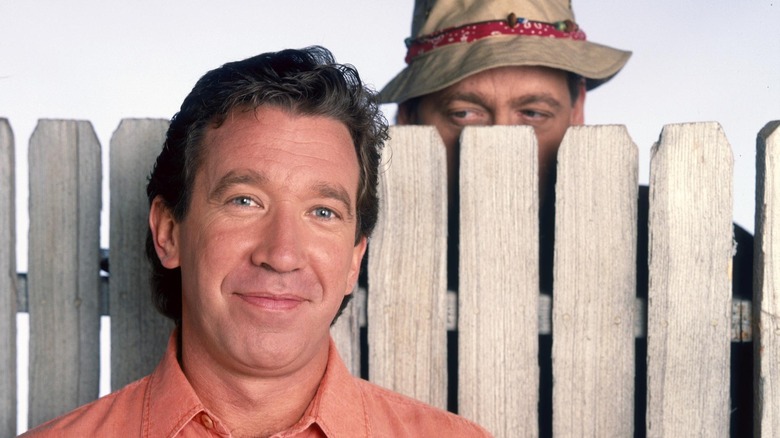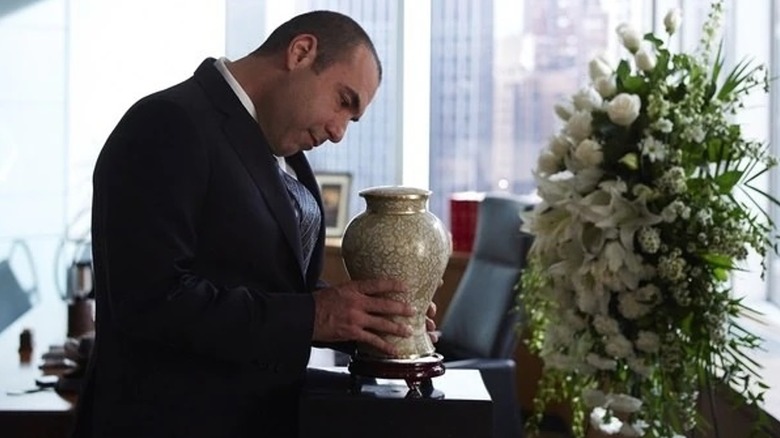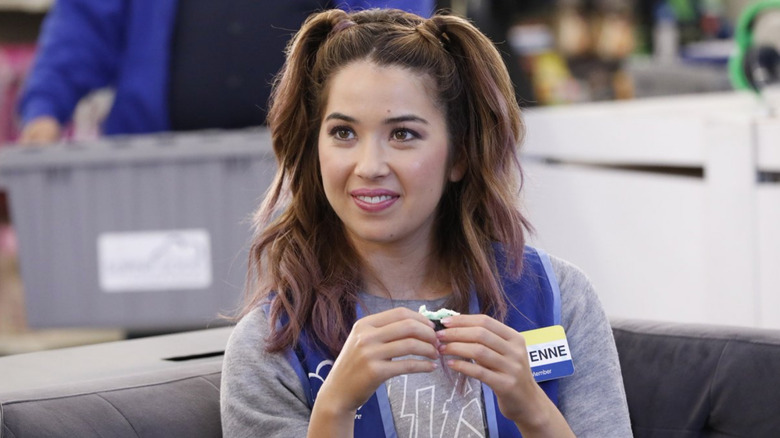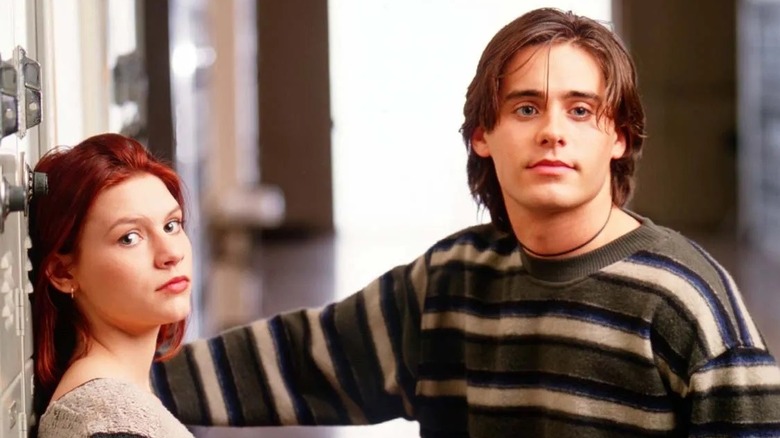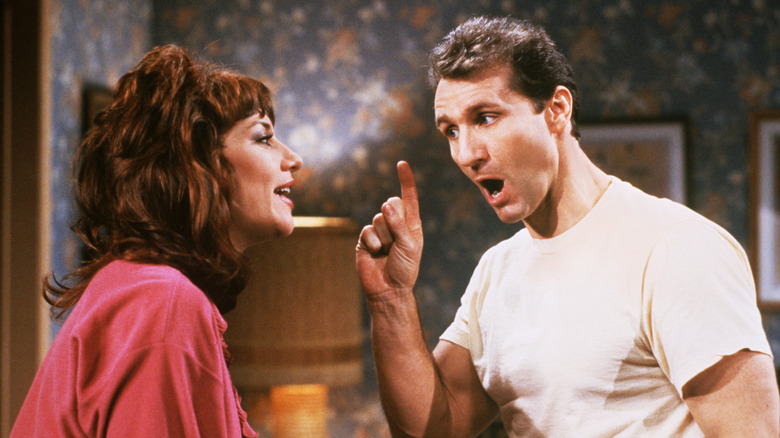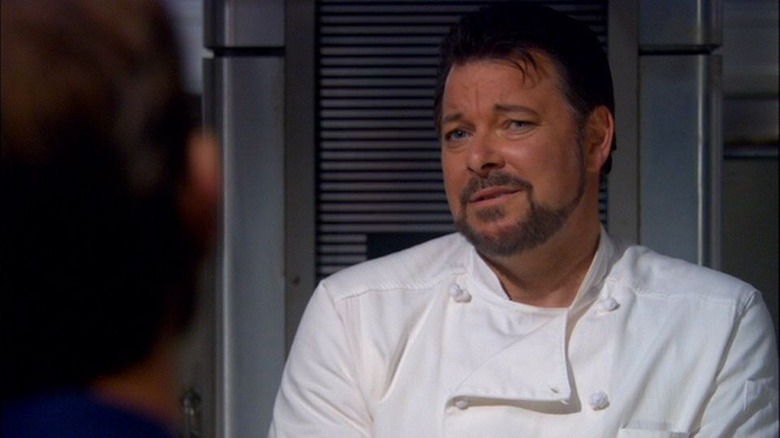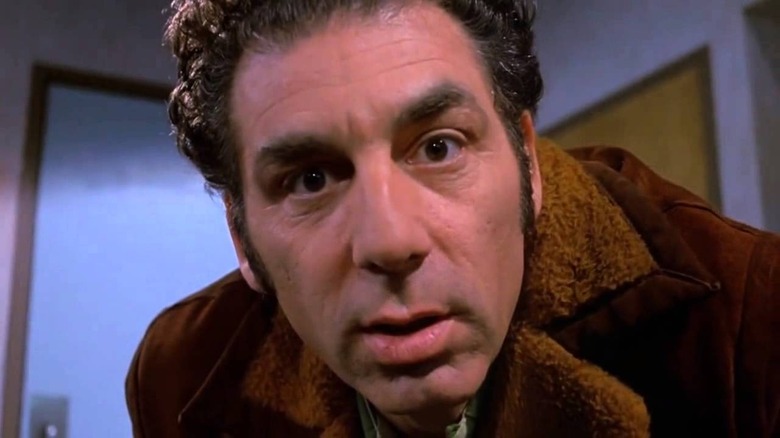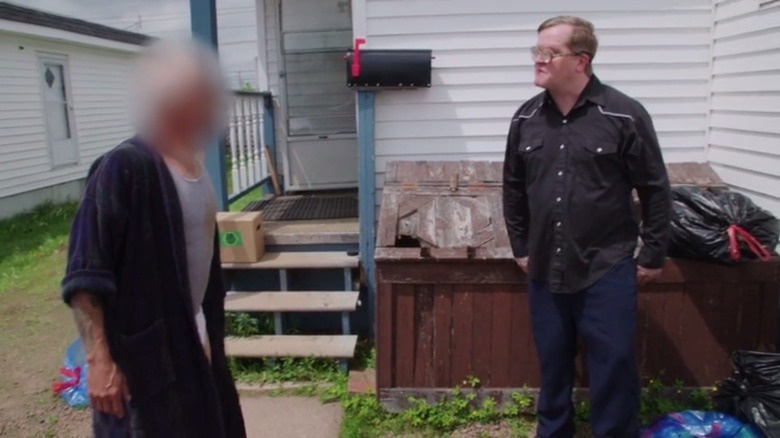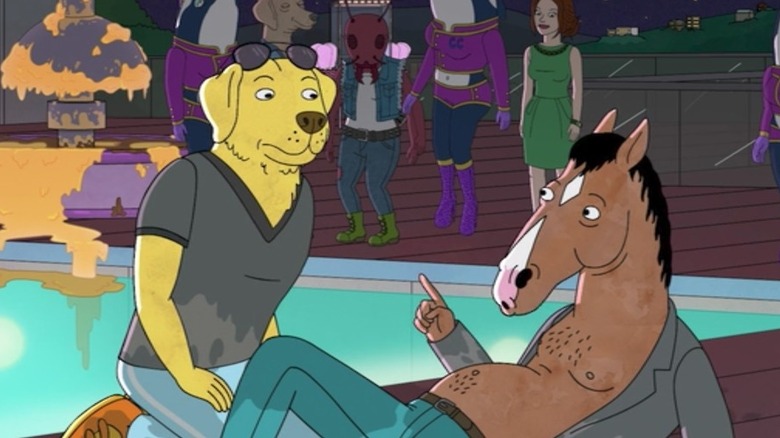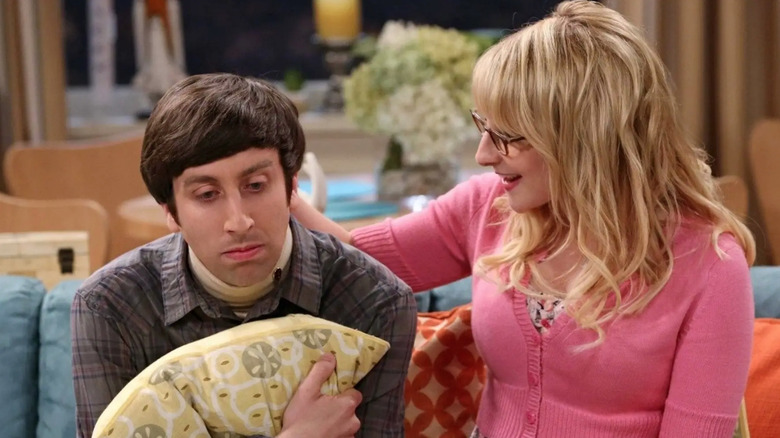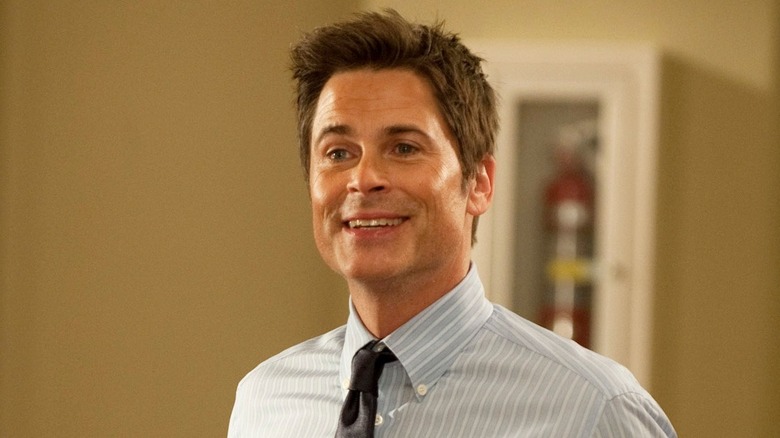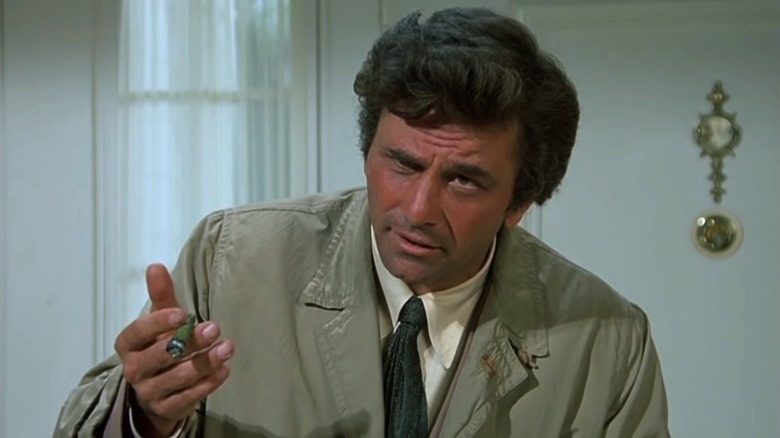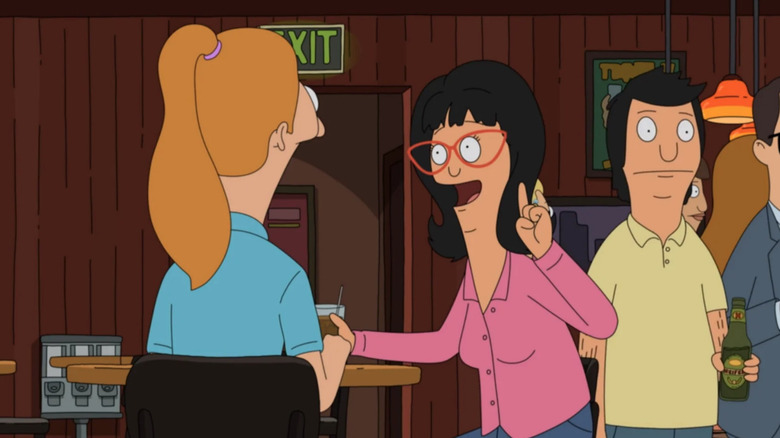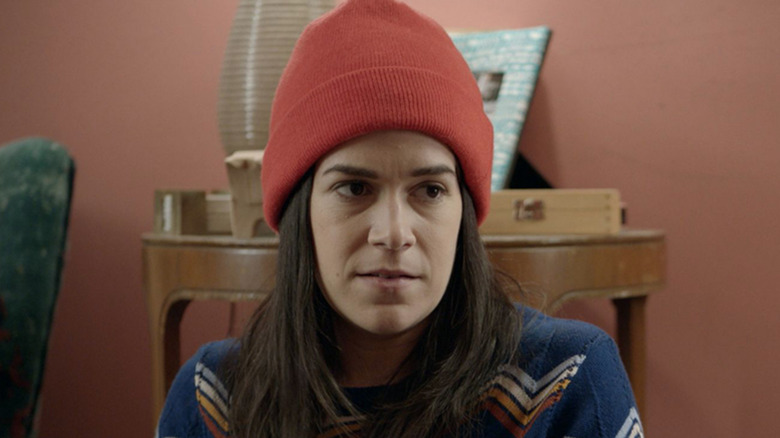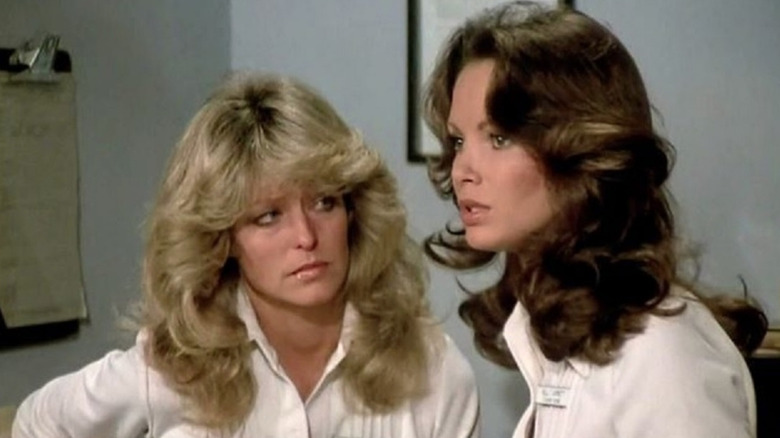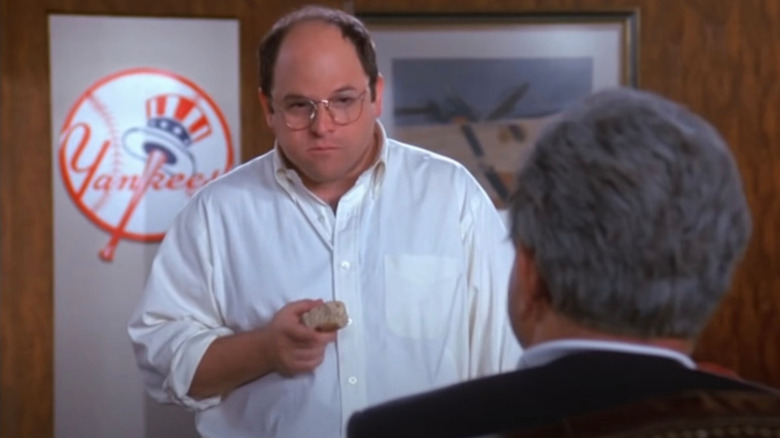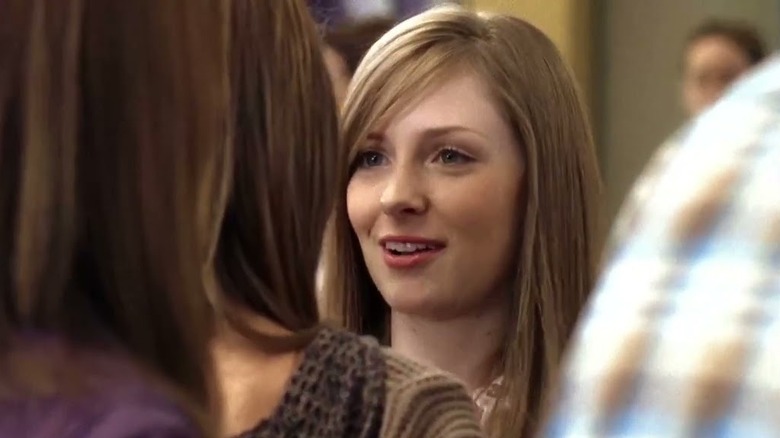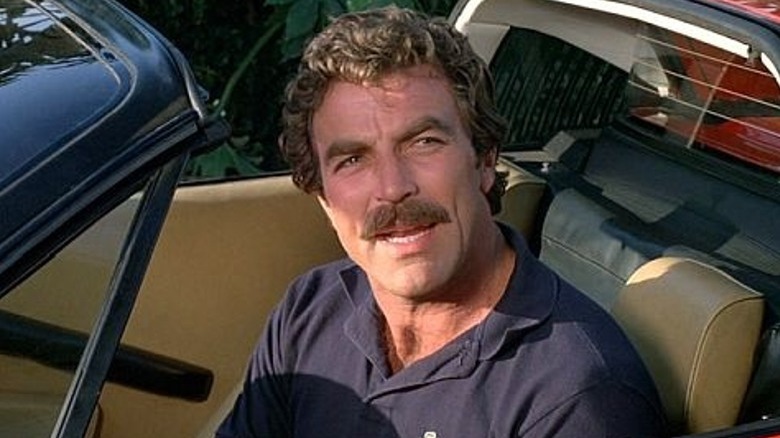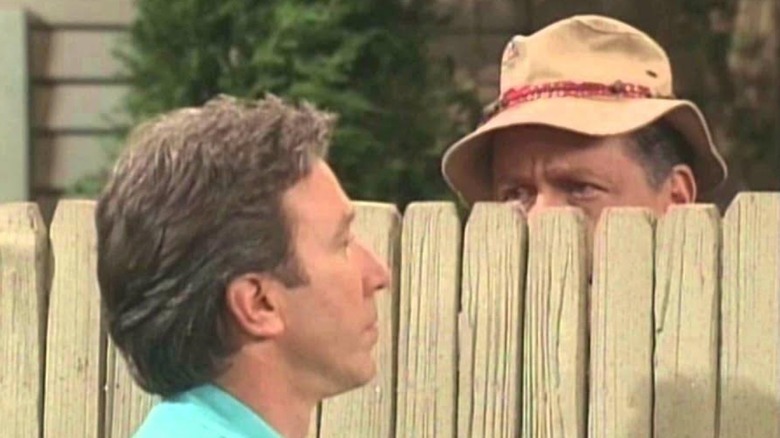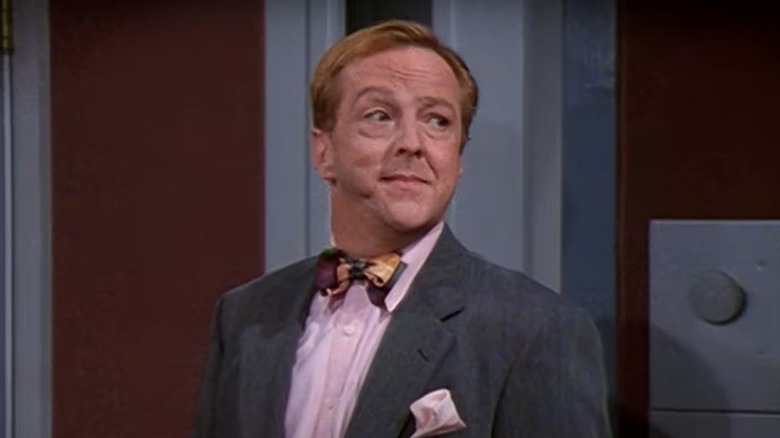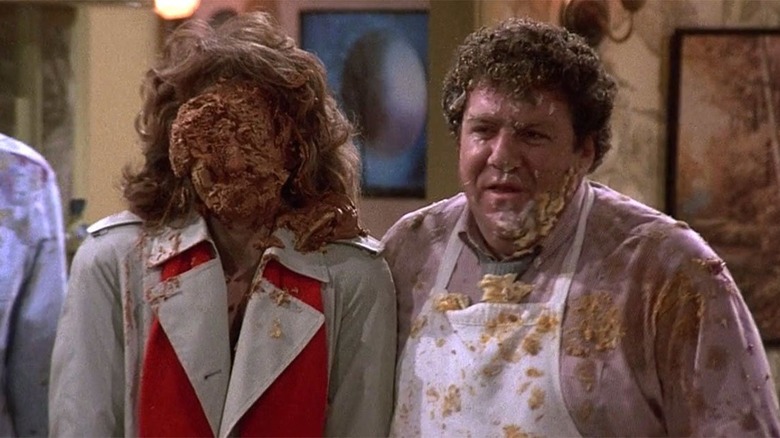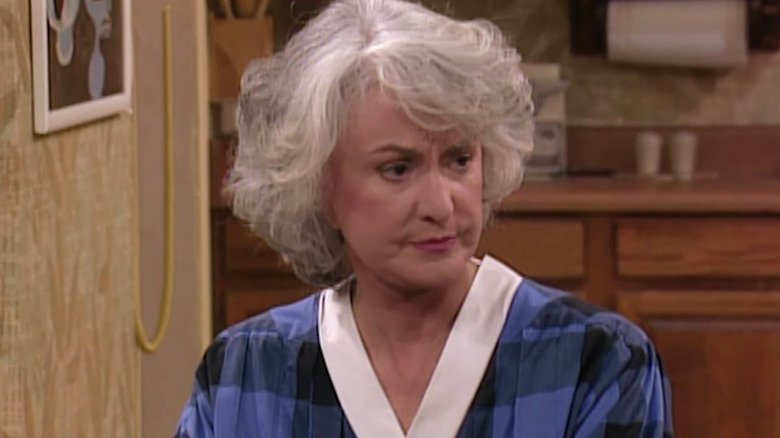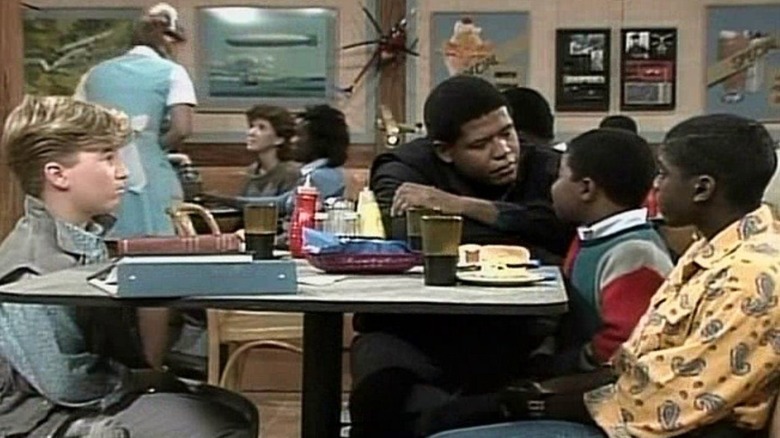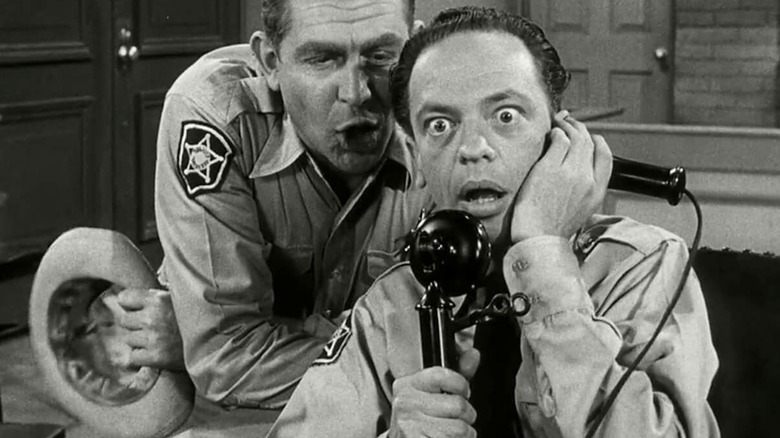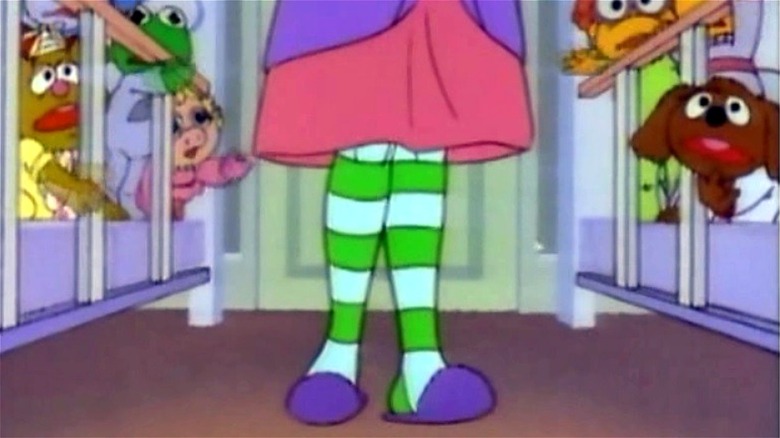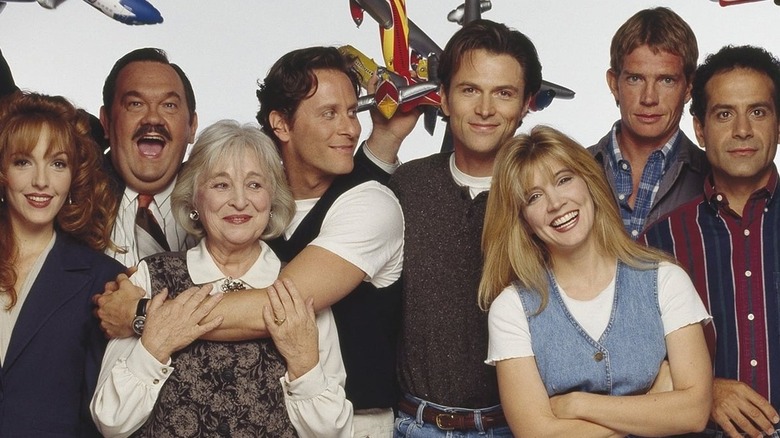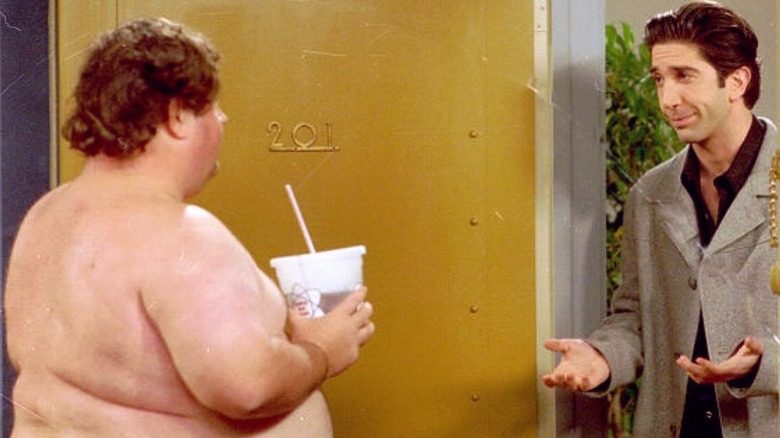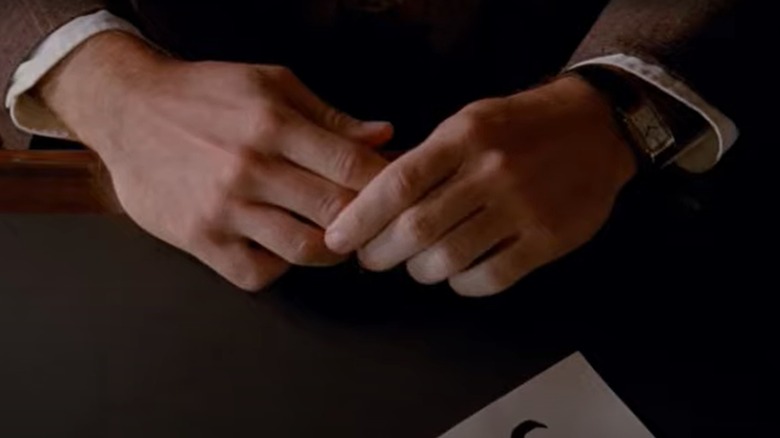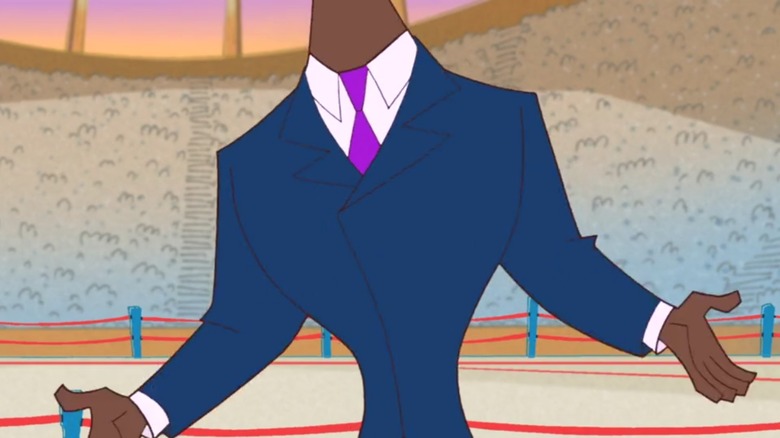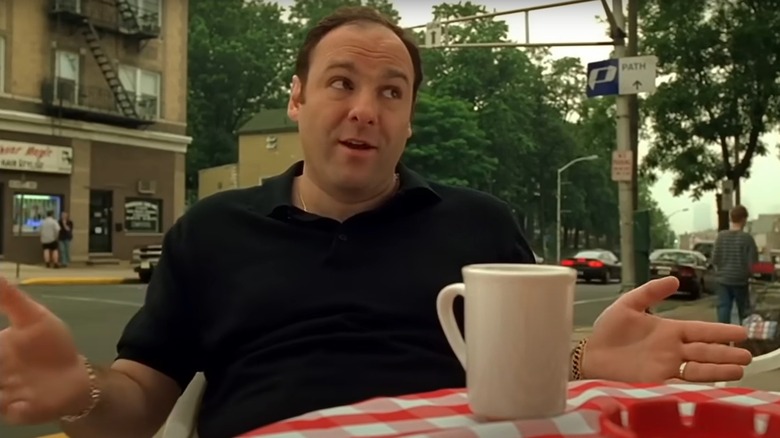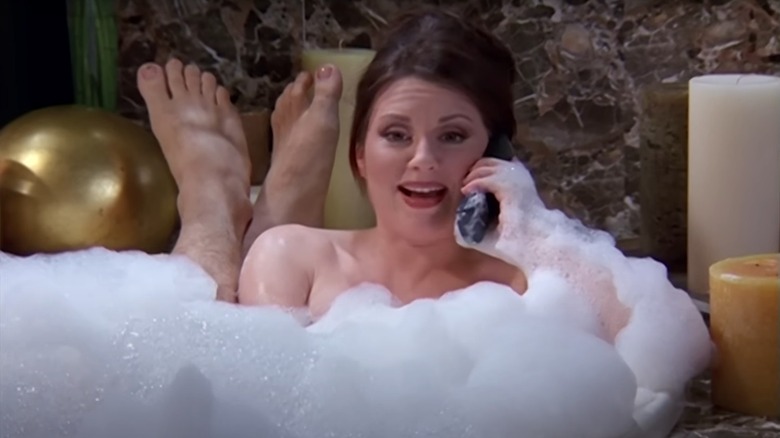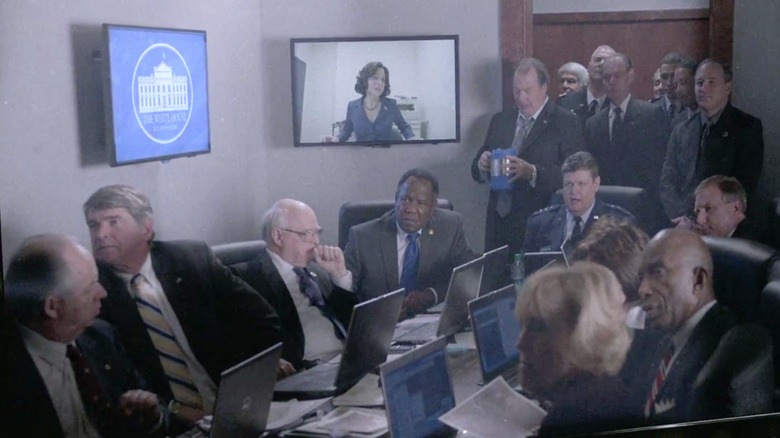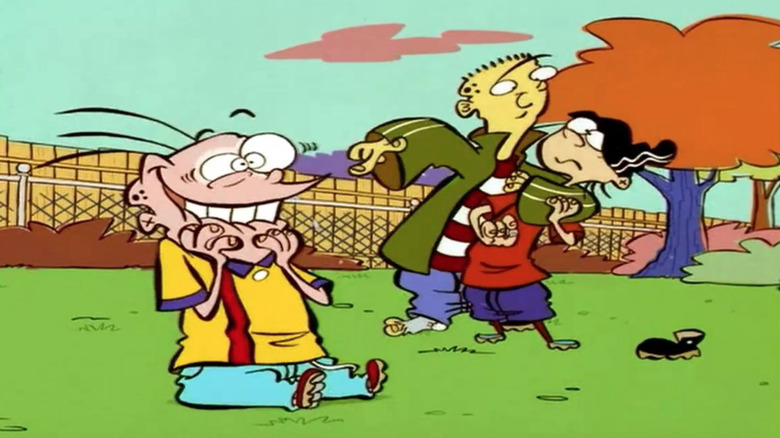TV Characters That Never Show Their Face On Screen
As the famous saying goes: Absence makes the heart grow fonder. Perhaps this explains our fascination with TV characters who never show their faces. Many of the best television shows of all time feature characters who we don't actually see — we learn about them and their antics through other characters. In most cases, actors were never cast for these characters, and so our imaginations could run wild. We feel like we know them through all the stories we hear and the responses to them, giving them vivid life and also making them crucial to the plot.
Often, such hidden people are the subjects of tales other characters tell on barstools. In some cases, the stars regularly interact with these covert figures over the phone or through recordings, so we don't need a face or a body for the bit to work. Sometimes, these characters do actually appear on screen — though only with their faces conveniently obscured or blurred. It's a trope that TV shows have been using for decades, but it never seems to get old. We've put together a list of the best examples of TV characters that never show their (full) face on screen.
Norma - Suits
In the legal drama "Suits," corporate attorney Louis Litt has an assistant called Norma who is never seen but frequently referenced. One of the show's running gags involves Litt's constant disregard for and mistreatment of Norma. Choosing not to appreciate Norma's work, he brazenly expresses his preference for the assistant of his colleague Harvey Specter (Gabriel Macht), a move that perfectly aligns with Litt's character.
To be fair, based on descriptions of Norma from other characters, she's clearly not the best at her job. Yet, despite any professional shortcomings, it's clear that Litt holds an attachment to her, a sentiment he might downplay but can't entirely conceal. In a sad turn of events during the Season 4 finale, Norma is revealed to have died while caring for her sister. Litt shares that Norma's supposed final wish was to have her ashes placed closer to him. As a result, an urn containing Norma's ashes is placed behind his desk, serving as a perpetual punchline.
Corona - Superstore
Long before the workplace sitcom "Superstore" embraced the COVID-19 pandemic as part of its storyline, Cheyenne had a friend named Corona who was the source of strange anecdotes. During the multiple times that Cheyenne (Nichole Sakura) name-drops her friend, we learn that she sells her pee on the internet, has gotten paid $10,000 by a stranger to fart on a cake, has swallowed a tapeworm that ate one of her organs, and roped Cheyenne into a pyramid scheme. Yet, viewers never see or even hear the character for themselves. By the time Season 6 came along following the height of the COVID-19 pandemic, Corona mysteriously faded into obscurity.
Whether the creators deemed it insensitive or simply grew tired of the gag remains unclear. Nevertheless, viewers have been left to ponder the reasons behind the character's sudden disappearance, forever shrouded in mystery. On Reddit, fans have discussed how they feel the writers missed a trick by not referencing the character during the pandemic episodes in some way. "I think it would have been funny if one of the last stories we got about Corona is how she changed her name due to the pandemic. And then have it be worse than Corona," said u/ShmebulocksMistress said.
Tino - My So-Called Life
The cult classic '90s teen drama series "My So-Called Life" has been praised for its authentic depiction of adolescence and its nuanced exploration of social issues faced by teenagers. Perhaps one of the more accurate aspects of the show was the addition of the unseen character Tino, who seems to be entangled in the group of friends' lives but never actually seen on-screen. His enigmatic presence in the show is a relatable representation of those elusive friends of friends that teens frequently hear about but rarely encounter in person.
Since Tino's only ever mentioned briefly by others, there's not much to his character besides the fact that he's closest with Jordan (Jared Leto) and Rayanne (A.J. Langer) and is the lead singer of Jordan's band, The Frozen Embryos. That is, until he quits and causes a rift in Episode 14. Who knows, maybe if the show was picked up for a second season, Tino would've eventually made an on-screen appearance. As it is, he'll always be one of those characters who had a big influence on the main cast but was never actually seen in person.
Peg's mom - Married with Children
The apple doesn't fall far from the tree in the sitcom "Married with Children," as evidenced by Peg (Katey Sagal) and her mom. Laziness and binge eating seem to run in the family, both being issues for this mother-daughter duo. However, while Peg manages to maintain a healthy weight, the same cannot be said for her mother. The show's (somewhat dated and offensive) running joke about Peg's mom is her size. Nearly every mention of her character involves a jab at her presumed obesity.
Although her exact weight remains a mystery, the series paints a vivid picture of her larger-than-life persona. Based on the way she's described by other characters, we know details like how she travels in a horse trailer, occupies three beds simultaneously during sleep, and once caused Al (Ed O'Neill) to experience temporary blindness after an unexpected encounter in the bath. Despite never making an on-screen appearance, Peg's mom becomes a notable presence throughout the series, finally acquiring her own voice in Season 10, brought to life by actress Kathleen Freeman.
Chef - Star Trek: Enterprise
In some "Star Trek" series, if a character wants food, all they have to do is walk up to a food replicator, say the name of the food and it appears out of thin air. You want chocolate cake? Go up to the replicator and say "chocolate cake" and presto, there's chocolate cake. But in the retrospective series "Star Trek: Enterprise" — set a century before the events of "Star Trek: The Original Series" — things weren't quite as luxurious for Captain Jonathan Archer (Scott Bakula) and his crew. If you wanted chocolate cake aboard the Enterprise NX-01, someone had to actually make it, and that someone was Chef. Chef who? We have no idea.
All we know is that Archer pulled some strings to get an acclaimed cook assigned to the Enterprise, and everyone was keen on keeping him happy. The only time we ever came close to meeting Chef was in the series finale, "These Are the Voyages...," though it wasn't really Chef. The story was told from the point of view of "Star Trek: The Next Generation" character Will Riker (Jonathan Frakes), who used the holodeck to simulate the Enterprise NX-01's adventure. Riker took on the role of Chef in the illusion, and he spent a lot more time in the kitchen than he did aboard his own Enterprise. For a guy who lived in a time when you could tell machines to magically summon food, he sure did like to cook.
Bob Sacamano - Seinfeld
He was never seen, but Kramer's (Michael Richards) good friend Bob Sacamano nevertheless left an indelible mark on the hit sitcom "Seinfeld." No matter what the situation, it seemed, Kramer had a relevant Bob Sacamano story waiting — and if Seinfeld's eccentric neighbor was to be believed, Sacamano lived an almost impossibly interesting life. In the Season 2 episode "The Heart Attack," Kramer tried to scare George Costanza (Jason Alexander) with a story about Sacamano entering the hospital for a hernia operation and then winding up spending the rest of his days staring out a window and saying "My name is Bob!"
In spite of this dark fate, Bob kept busy. In "The Fix-Up" from Season 3, Sacamano got a job at a condom factory; in "The Chicken Roaster" from Season 8, we were told he had a gig selling fur hats in Battery Park; by Season 9, the episode "Puerto Rican Day" had Kramer claiming that Bob came up with the idea of adding rubber bands to toy paddles. According to Kramer's tales, Sacamano was a good guy who had just caught his share of bad luck. He contracted rabies, he was subjected to electroshock therapy unsuccessfully because his synapses are too large, and — perhaps most traumatically — he lived with Kramer for a year and a half.
Donny - Trailer Park Boys
A character who is seldom seen but never unheard, Donny's presence in the series "Trailer Park Boys" is marked by his distinctive and often screamed responses to the absurd events that unfold around him in Sunnyvale Trailer Park. Voiced by the talented Mike Smith, who also portrays Bubbles, Donny is defined by his constant anger and profanity, which he channels in unforgettable one-liners. Whether it's due to a satellite TV interruption or gunshots ringing out, Donny's reactions are a symphony of screams that punctuate the daily madness.
The anticipation surrounding Donny builds over the seasons, and fans finally catch a glimpse of him in Season 11, with Dino Ninos standing in as the body. However, to keep up the running gag, Donny's face is blurred out, leaving viewers with more questions than answers. Although his face may remain unseen, his voice became an integral part of the Sunnyvale experience. The fact that the creators decided to show him on screen after so much time as a disembodied voice split fans. "I hated they showed him," said Redditor u/xfan412. "This is a clear sign they are out of ideas."
Erica - BoJack Horseman
One of the longest-running gags in Netflix's hit animated show "BoJack Horseman" revolved around a character who was always just off-screen. If you've seen the series, then you've no doubt guessed we're talking about Mr. Peanutbutter's (Paul F. Tompkins) friend Erica. Erica always appeared randomly, causing Mr. Peanutbutter to notice and leave the scene to talk to her.
What little we know about Erica mostly came from Mr. Peanutbutter's hilarious exclamations. For example, a number of his quips made it clear that she'd had some legal trouble. In the Season 2 episode "Yesterdayland," Mr. Peanutbutter could be heard calling out, "Erica! You can't be here! This place is filled with children!" In "The BoJack Horseman Show" from the following season, he reminded her: "Erica! You know you're not allowed to vote in national elections!"
It was also suggested that Erica had suffered a number of physical disfigurements. In the episode "Horse Majeure" from Season 1, Mr. Peanutbutter says, "Long story short, Erica did have to lose the foot, but she gained a friend." Then came the Season 4 episode "Underground," when he yelled, "Erica! Look at you with the right number of ears!" Other comments throughout the series referred to Erica spending time in a burn ward and undergoing a "split brain procedure."
Mrs. Wolowitz - The Big Bang Theory
Howard's mom — known to viewers simply as Mrs. Wolowitz – never needed to show her face in "The Big Bang Theory" because her voice alone was a larger-than-life presence. Thanks to the booming performance of Carol Ann Susi, Mrs. Wolowitz became a fan-favorite character over the years. When Susi died in 2014, the whole cast and crew were shaken. Everyone was on set when they got the news, and it became "an impromptu memorial where people started to share their wonderful memories of Carol Ann," showrunner Steve Molaro told The Hollywood Reporter.
Viewers said goodbye to Mrs. Wolowitz alongside Howard (Simon Helberg) in Season 8's "The Comic Book Regeneration." In the episode, Mrs. Wolowitz visits her sister in Florida. During her visit, Howard receives a phone call from his aunt, breaking the news that his mother passed away in her sleep. The loss is felt deeply as Howard and his friends mourn the death of their shared mother figure. Steve Molaro explained to The Hollywood Reporter that Mrs. Wolowitz would not be replaced with another actor in order to let the character exit the series with the dignity she deserved, marking the end of an era and honoring the memory of Susi.
Dr. Richard Nygard - Parks and Recreation
When the normally sickeningly positive Chris Traeger (Rob Lowe) surprised everyone by feeling too much negativity in "Parks and Recreation," he started seeing therapist Dr. Richard Nygard. He came to depend so fully on the therapist that in the Season 5 episode "Halloween Surprise" he said Nygard held his life "in his hands like a fragile little bird." In that same episode, Chris revealed that he'd been seeing the therapist five times a week, and four episodes later in "Ron and Diane," the frequency increased to fifteen times a week.
Dr. Nygard's impact on Chris' life was so intense it helped lead to a fan theory that Nygard was secretly a cult leader. It was one of the more solid fan theories, supported by Chris' claim that the therapist's patients referred to themselves as "Nygardians," as well as the fact that most of the patients (at least, the ones we knew about) never seemed to actually get better.
Whether he was a cult leader or not, the unseen Dr. Nygard certainly cultivated a heavy sense of dependence in Chris. Some of Chris' more disturbing quotes about his therapist included when he likened his relationship with Nygard to Leslie and Ben's (Adam Scott) romantic relationship in "Ron and Diane," and his farewell episode "Ann and Chris" when he said to Leslie, "I just want to say that getting to know you and watching you work has been one of the greatest experiences of my life — that, and working with Dr. Richard Nygard."
Mrs. Columbo - Columbo
For three decades, the late Peter Falk made an art out of feigning simple-mindedness as Lieutenant Frank Columbo in the TV series "Columbo" and numerous subsequent TV movies. The brilliant detective loved to catch his suspects off guard by seeming inept, all the while drawing as much information from them as possible. One of Columbo's tactics was telling stories about his wife, who we never saw or met. In fact, the absence of Columbo's wife led to the popular theory that she didn't actually exist. Notice that we don't call this a "fan" theory, because it isn't just fans who think it's valid.
In a 2002 interview with the Archive of American Television, "Columbo" co-creator William Link said the theory was valid. While Link didn't say whether or not he felt it was true that Columbo's wife was just a fantasy, he admitted that he likes the theory and thinks it's absolutely possible. Link went on to explain exactly why you never saw Columbo's family in any of his stories, saying that he and co-creator Richard Levinson wanted Columbo to be even more of a mystery than the crimes he solved. "We wanted to keep him almost mythological," Link recalled. "He comes from nowhere and goes back into nowhere."
However, a short-lived "Columbo" spin-off titled "Mrs. Columbo" featured Columbo's wife. She was finally given a first name — Kate — and was portrayed by Kate Mulgrew for two seasons. Viewers finally got to see her face, though technically this was a new and improved version of the character.
Ginger - Bob's Burgers
Linda's friend Ginger has been mentioned on multiple occasions in "Bob's Burgers" and she has even made two on-screen appearances, but we still haven't seen her face. Despite the fact that viewers don't know what she looks like, Ginger is a fully fleshed-out character. She's a trusted confidante of Linda, always ready for a juicy gossip session or a stroll down memory lane. After much anticipation, Ginger made her first appearance (from behind) during a flashback about how Bob and Linda first met in the Season 6 premiere "Sliding Bobs." For the first time, viewers got a glimpse of Ginger's ginger hair and tasteful blue top.
Ginger made another from-behind appearance in the Season 12 episode "Clear and Present Ginger," in which she drives 82 miles just to visit Linda like the good friend we know she is. Although fans may be eager to lift the veil on the mystery of Ginger's face, the running joke makes her character all the funnier. The prospect of a face reveal raises questions about whether she could ever live up to the imaginative character we've collectively constructed in our minds.
Melody - Broad City
From navigating the tumultuous landscape of dating in New York to the drag of having to work a dead-end job to survive, "Broad City" authentically captures what it's really like trying to make it as a young adult in the big city. The series cleverly transforms these relatable challenges into comedic gold. An early running joke featuring Abbi's elusive roommate Melody is one example that many who've experienced the oddity of rooming with someone they rarely cross paths with can relate to. While it may seem ideal to have a roommate who's never around, Abbi's situation is slightly different since she has to deal with the discomfort of having Melody's boyfriend make himself at home.
The closest we ever get to seeing Melody is from behind a bathroom door or in photos where her face is conveniently obscured. As the series progresses, it becomes easier to forget who Abbi's roommate really is, which even Abbi herself admits. "At the end, it was just hilarious that Abbi kind of forgot about Melody," show creator and star Abbi Jacobson explained to Deadline. "Did she ever live there? What's going on? So we decided that it was better without ever revealing her."
Charles Townsend - Charlie's Angels
While some have praised the franchise for helping to change attitudes on feminism, there's no getting around the fact that the success of the original "Charlie's Angels" was linked to certain wardrobe choices. "When the show was number three, I figured it was our acting," said Farrah Fawcett, who starred as Jill Munroe in the first season of the show (via the Independent). "When it got to be number one, I decided it could only be because none of us wears a bra." At the heart of the series lies the mystifying figure of Charlie Townsend, the head of the Charles Townsend Agency and the Angels' unseen mentor.
Operating behind the scenes, Charlie relays instructions to the Angels (who are essentially private investigators) via a speakerphone, an omnipotent presence that guides their every move. Although he was only ever heard, the actor who portrayed Charlie, John Forsythe, was one of the only main cast members to remain on the show for the full five seasons — the other two were Jaclyn Smith (who played orphan-turned-Angel Kelly Garrett) and David Doyle (who played John Bosley, the only Townsend Agency employee who actually knows Charlie personally). Forsythe reprised his role in the "Charlie's Angels" film series, lending his voice to 2000's "Charlie's Angels" and 2003's "Charlie's Angels: Full Throttle."
George Steinbrenner - Seinfeld
When George Costanza worked for the New York Yankees in "Seinfeld," he answered to Yankees owner George Steinbrenner, an exaggerated and satirical caricature of the real-life figure. Instead of casting a lookalike for the role, show creators Larry David and Jerry Seinfeld chose never to show his face to heighten the comedic mystery of the character. The extent of Steinbrenner's on-screen presence is confined to shots of the back of his head. The role was filled by actor Lee Bear, while David provided the voice of Steinbrenner.
The dynamic between the lazy and scheming Costanza and the eccentric and temperamental Steinbrenner made for hilarious interactions between the two characters. Although Costanza eventually lost his job with the Yankees, Steinbrenner made one last appearance during the main character's trial in the finale. In an interview with The Rich Eisen Show, David revealed that the real Steinbrenner was originally supposed to play himself in the scene, but after looking back at his performance during the editing process, David decided the episode would be better off without the poorly-acted cameo.
Heather Sinclair - Degrassi: The Next Generation
A running gag in the teen drama "Degrassi: The Next Generation," Heather Sinclair is the epitome of an unseen character who everybody loathes. She has it all — beauty, intelligence, and popularity, but she also has a reputation for being an unabashed mean girl. She's first mentioned in Season 1, Episode 5, "Parents' Day." Viewers find out about her through the reactions of others and the echoes of her insults throughout the series. Based on comments made by other characters, we know she's conventionally attractive with chunky highlights and an obvious nose job.
In a "Degrassi Mini" (which is a series of shorts featuring various Degrassi characters) called "Be Aware of Heather Sinclair," the clever camera angles used as Heather's point of view keep the enigma intact, despite the story centering on her and her despicable treatment of her classmates. As she navigates the school corridors, we catch only fleeting glimpses of the havoc she causes. The audience is left to piece together the puzzle of her character through the lens of those who bear witness to her antics — all we really know about her is that Holly (Charlotte Arnold) is her adoptive younger sister.
Robin Masters - Magnum P.I.
For eight years, Tom Selleck starred as the eponymous investigator of one of the signature shows of the '80s — the popular crime drama "Magnum, P.I." While Thomas Magnum might technically have been a part of the same profession as famous fictional private eyes like Humphrey Bogart's Philip Marlowe, he enjoyed a lot more luxury than such fictional hardboiled investigators struggling to make ends meet. Magnum made his home in the expansive Robin's Nest beachfront estate in Oahu, Hawaii, and as far as we could tell, never paid so much as a dollar in rent.
That's because Magnum operated as a guest of the celebrated author Robin Masters. It was never made clear exactly why Masters wanted Magnum on his property, but it was implied the P.I. had been considered a benefit to the estate's security. It's tough to say for sure, because we never actually saw the guy. For the entire run of the show, we only ever heard Masters' voice five times. Perhaps as a tribute to Orson Welles' work in "The Third Man," in most of these episodes the legendary actor/writer/filmmaker/magician lent his voice to Magnum's much-discussed benefactor. The only exception was the Season 6 premiere entitled "Deja Vu," which aired a few weeks before Welles' 1985 passing and featured Red Crandell as the voice.
Toward the end of the series, Magnum began to suspect that Higgins (John Hillerman) — the caretaker of Robin's Nest — was the real Robin Masters, and Higgins confirmed this in the series finale... until he didn't. During Rick's (Larry Manetti) wedding, Higgins changed his story. If we ever want to learn the truth, it seems like we might have to hire a P.I. of our own.
Wilson - Home Improvement
Everyone could benefit from having a neighbor as friendly and wise as Wilson (Earl Hindman) from "Home Improvement." In the sitcom, which ran for eight seasons, the Taylor family can always count on their neighbor for sage advice. He's often crucial when it comes to solving each episode's conflict. Even more impressively, he does it all without ever showing his face. The most viewers ever see of Wilson is the top of his head and his trademark hat as he peeks over the fence for some neighborly chit-chat with Tim Taylor (Tim Allen).
You may be wondering how the idea for the semi-anonymous neighbor came about. The story behind Wilson's hidden face was actually inspired by creator and star Tim Allen's childhood neighbor, who he could never see over his family home's tall fence. During a visit to Marc Maron's podcast, Allen revealed the idea of keeping Wilson's face obscured was part of the initial pitch for the show. Who could have predicted that this childhood memory would later become the creative spark for one of the most memorable never (fully) seen characters in TV history?
Deb Chesterton - Frasier
Gil Chesterton (Edward Hibbert), the flamboyant host of "Restaurant Beat" on KACL talk radio, first graced the "Frasier" universe in the Season 1 episode "Frasier Crane's Day Off." Much like the show's titular character, Gil exudes pomposity, sophistication, and a penchant for the dramatic. His distinct mannerisms lead his co-workers to speculate about his sexuality. Amidst the gossip, Gil insists that he is married to a woman named Deb, who he is completely dedicated to and is definitely not a cat.
Before long, Deb becomes a topic of both intrigue and speculation. Is Deb a real person, or is she a figment of Gil's imagination? The sitcom cleverly navigates this ambiguity by never actually showing the character on-screen, leaving viewers to ponder the nature of Gil's marital status. Is Gil's marriage a genuine commitment or an elaborate lie? We'll never know, but one thing's for sure — the mystery surrounding Deb is one of the show's best running gags.
Vera - Cheers
Throughout all 11 seasons of the sitcom "Cheers," Vera Peterson managed to serve as a steady recurring joke, even while physically almost never showing up. Existing chiefly via quips from Norm (George Wendt), who was famously always dodging his haranguing wife so he could sit on his favorite barstool and partake of a brew, the specter of Vera (and her phone calls to the bar) became a dependable punchline. One of the reasons Cheers became a classic show, however, is that it had its heart in the right place — so every now and then, despite all the Vera jokes, Norm would occasionally have a heartfelt moment with her, showing they truly cared for each other.
The gag eventually became a peekaboo game with the audience, as the show's creators acknowledged and played with their desire to finally see the character. So, "Cheers" fans heard Vera's voice a handful of times, and the show's creators chose to cast Bernadette Birkett — George Wendt's real life wife — in the role. We only kind of saw Vera once. In the much-discussed Season 5 episode "Thanksgiving Orphans," Diane (Shelley Long) ended a messy food fight by hurling a pie which, instead of her intended target, hit Vera right in the face. As audiences leaned in for a closer peek, the laugh was in realizing that her face had been completely concealed. The episode ended with Vera saying: "Charming friends, dear. Get your coat." Vera was once again voiced by Birkett in the scene, but it was Rebecca Soladay physically standing in for Wendt's wife.
Phil - The Golden Girls
In "The Golden Girls," Dorothy (Bea Arthur) has a brother named Phil. Though he's never physically seen, he ultimately influences the series by challenging societal norms and adding depth to the existing Petrillo family dynamics. His role as Sophia's (Estelle Getty) cross-dressing son introduces a progressive exploration of gender identity and acceptance, pushing against the conventions of the time. The occasional references to Phil throughout the series illuminate a complex mother-son relationship marked by distance and occasional disapproval.
Tragically, Phil's story reaches an end in the Season 6 episode "Ebbtide's Revenge," when Phil dies of a heart attack while trying on women's clothes in a dressing room. In the aftermath of Phil's passing, his widow spends a week with the girls, unearthing the buried emotions Sophia harbors and forcing her to confront the shame she's felt toward Phil. Drawing upon her grief counseling skills, Rose (Betty White) imparts wisdom, emphasizing all the positives to remember about Phil.
The Gooch - Diff'rent Strokes
Some unseen TV characters are romantic partners, some are friends, and some cook meals on spaceships. But in the case of the '80s sitcom "Diff'rent Strokes," the series' most infamous faceless character is the schoolyard nemesis of Arnold Jackson (Gary Coleman). First mentioned in the Season 1 episode "The Fight," the bully known only as "The Gooch" terrorized Arnold throughout the series. In the Season 2 episode "Return of the Gooch," Arnold took karate lessons to defend himself, then in the Season 7 episode "Carmella Meets the Gooch" he tried to get an Italian exchange student to protect him with the promise of a date with Willis (Todd Bridges).
Season 4 brought "The Big Heist," where Arnold got caught stealing an expensive copy of the 1964 comic book "Amazing Spider-Man" #14 in order to join The Gooch's gang, and in the Season 5 episode "The Cricket," Arnold believed that a lucky cricket would keep The Gooch from messing with him — a theory that ultimately did not work. Conventional wisdom tells us that once you confront a bully, they'll stop bullying you. "Diff'rent Strokes," on the other hand, taught us that once you confront a bully they'll stop bullying you... until the next time the writers need a bully for a storyline.
Juanita Beasley - The Andy Griffith Show
The trope of TV characters you never see is nothing new, as there's a perfect example in the black and white comedy classic "The Andy Griffith Show." While you may not think of Don Knotts as a ladies' man, at least one waitress working at Mayberry's Bluebird Diner would disagree. Throughout the series, Sheriff's deputy Barney Fife (Knotts) regularly made romantic phone calls to Juanita Beasley. Usually waiting for a rare moment when he had privacy, Barney pretty much always wound up embarrassed by the end of the calls, usually because the titular sheriff had snuck in to listen and make fun of him.
For example, in the Season 1 episode "Andy Forecloses," Barney was caught singing to Juanita over the phone. The sheriff creeped up behind Barney, eventually joining in on the song. A couple of seasons later in "The Great Filling Station Robbery," Andy made a repeat performance — except this time rather than singing to Juanita, Barney had been reciting a horrible original poem to his girlfriend (which was mostly comprised of the word "Juanita" and bad attempts to rhyme it). Barney almost always responded by yelling, hanging up the phone, and mussing up his hair in rage. Honestly, Juanita must have really been smitten with Barney to keep going out with him, even after getting hung up on so many times.
Nanny - Jim Henson's Muppet Babies
"Jim Henson's Muppet Babies" was a hit with young viewers and families throughout the '80s and into the '90s. Beloved for its age-appropriate humor and educational content, it features the well-known muppet characters as babies. The person taking care of all those babies was known only as Nanny, the unseen caretaker who's only ever shown from the neck down. All viewers ever see of Nanny is her favorite outfit, consisting of a pink skirt, purple cardigan, green-striped stockings, and purple sneakers.
In an interview with TV personality Dennis Pastorizo, "Muppet Babies" cartoonist Guy Gilchrist notes that her iconic stockings were "an ode to 'The Wizard of Oz.'" He also revealed the truth behind one of the most-asked questions: What does Nanny look like? Well, according to Gilchrist, Barbara Billingsley — best known for playing Mrs. Cleaver in "Leave it to Beaver" — wasn't only the voice behind the character, but also the face.
Edna - Wings
The masterminds behind "Frasier," a sitcom celebrated for introducing some of the most unforgettable unseen characters in television history, initially experimented with this trope in their earlier series "Wings." The prototype for this intriguing narrative device was none other than Edna, the on-again-off-again girlfriend of Antonio (Tony Shalhoub) who's best known for having an abnormally large face. Fittingly referred to at times as "The Big Faced Girl," Edna is first officially mentioned in Season 7, Episode 5, "Hook, Line, and Sinker."
In this episode, Edna and Antonio's relationship ends in a bad breakup. To help Antonio get over his heartbreak, his friends set him up with another woman. From then on, Edna is mentioned on multiple occasions and even briefly dates rival character Roy Biggins (David Schramm) to make Antonio jealous. Viewers never see or hear Edna but they can easily imagine what she's like based on the vivid descriptions – according to Antonio, "making love to her is like making love to a Jack-O-Lantern."
Ugly Naked Guy - Friends
"Friends" had a ton of guest stars and side characters over the years. Some were forgotten about almost immediately, while others remained in the background throughout much of the series. One person who was around from the beginning is Ugly Naked Guy, who wasn't seen on camera for a very long time. There's an episode where the group believes the subject of their collective voyeurism is dead, so they fashion an incredibly long poking stick out of chopsticks to make sure he's okay.
Later, Ross (David Schwimmer) finds himself in need of an apartment, so he wanders across the street and knocks on the man's door. He answers wearing no clothes. You don't see his face or the front of his body, but Ross sees him and acknowledges his nudity. To curry the man's favor, he embraces his lifestyle and strips down, scoring himself a new pad. After that, Ugly Naked Guy left the series, and he was never seen again on the show.
For almost 20 years, fans speculated about what Ugly Naked Guy actually looked like, but to no avail. Ugly Naked Guy only appeared in two episodes (one in 1996 and one in 1999), though he's obscured in both of them. All the other times, he's seen by the gang but not by the audience. Regardless, we now know who Ugly Naked Guy was: He was played by an extra named Jon Haugen, and he came forward in 2016. "It was the best time in my life," he told HuffPost, adding, "I was the man."
Dandy's therapist - American Horror Story: Freak Show
"American Horror Story: Freak Show" is the fourth season of the popular anthology series. It's just as shocking as the previous seasons, but there's one aspect of "Freak Show" that left some fans clueless, and it has to do with Dandy's (Finn Wittrock) therapist. In Episode 8, Dandy visits his therapist Dr. Feinbloom, but at no point does the audience see the doctor's face. All we see are his hands as he nervously fidgets while Dandy asks him some troubling questions about absorbing the "power" of other people through unspeakable acts.
Because the therapist's face remains out of sight, more than a few fans developed theories, one of which is that he's the same doctor from Season 2, subtitled "Asylum." However, Dr. Feinbloom doesn't sound like Zachary Quinto's Dr. Thredson from the second season. The show's IMDb page offers no answers, as Feinbloom isn't officially credited, though he's rumored to have been played by Danny Huston, who also appeared as Massimo Dolcefino in "Freak Show" and previously played the serial killer known as The Axeman in the third season, subtitled "Coven." Because his identity has yet to be revealed, it's possible that the therapist never actually existed and that he was only there in Dandy's mind.
Wizard Kelly - The Proud Family
Sometimes, a TV series will choose not to show a character's face to add some mystery around them. This has been done well in a variety of genres, including animation. "The Proud Family" is a rare example of an animated sitcom centered around a Black family, and it features tons of memorable characters, including Wizard Kelly, who appears in four episodes. The thing about Kelly is that he doesn't have a head — well, not one the audience ever sees in full, at least. His head is typically cut off around the mouth, but he's otherwise fully present. It's a little odd, as Kelly's missing face is unique in the series.
It turns out that the reason his head is cut off is entirely practical and wasn't done to add intrigue to the character. The frame simply couldn't accommodate such a tall character, so there wasn't space to actually draw his head. Series creator Bruce W. Smith and producer Ralph Farquhar explained this in an interview with Blavity. Farquhar said: "I remember Wizard Kelly, and Bruce just sat on the side and started drawing. This guy was so tall we never saw his face completely." Smith continued, "This guy is so tall, I ran out of paper, [which is] basically why he doesn't have a head." Despite the practical reason behind it, the mystery that Kelly's half-face created definitely added to the series' charm.
Ercole DiMeo - The Sopranos
The HBO classic "The Sopranos" is centered around Tony Soprano, played by the late James Gandolfini. We follow his rise to the top of New Jersey's criminal underworld, but Tony isn't the boss in the beginning; that responsibility fell upon Ercole DiMeo. He's referred to as the Old Man, which makes sense, as he's run the DiMeo crime family — for which Tony works — for decades. DiMeo founded his criminal enterprise in the 1950s. By the time the show starts, he's not only an elderly man, but he's also in prison. DiMeo is referenced numerous times throughout the series, but, while he's technically still the man in charge, he doesn't actually run anything. This is primarily due to the fact that he's incarcerated, leaving Jackie Aprile (Michael Rispoli) as his acting boss.
While DiMeo isn't seen at any point in "The Sopranos," he does appear in a related production. In "The Many Saints of Newark," which is a prequel film, DiMeo is present, and he's played by none other than "The Sopranos" creator and showrunner David Chase. It's a brief, blink-and-you'll-miss-it cameo, but at least he finally made an appearance. The film is set in the 1960s, so DiMeo was active as the boss during this time. He lands himself in prison in 1995 with a life sentence, but it's never made clear whether or not he was alive or dead by the end of "The Sopranos."
Stan Walker - Will & Grace
"Will & Grace" features plenty of incredible actors playing unforgettable characters, but one of the best is Karen Walker (Megan Mullally), Grace Adler's (Debra Messing) assistant. Throughout the show's run, Karen is married to Stanley Evelyn "Stan" Walker, and he's never seen on camera outside of his hands, legs, and feet in several scenes. Stan is described as being overweight and wealthy. He has a couple of kids with his first wife, and he married Karen sometime prior to the start of the show.
The audience knows a lot about Stan because Karen provides plenty of details. While she jokes that she only married him for his money, Karen admitted that she was truly in love with him. Stan is arrested during the fourth season for tax evasion, and his silhouette is briefly visible while Karen talks to him during a prison visit. His arrest and imprisonment lead to several problems in the Walker marriage, and the couple decide to divorce.
Unfortunately, Stan dies of a heart attack while sleeping with "the other woman," or so we thought — later in the series, it's revealed that Stan didn't die and was actually in witness protection the whole time. Two people stood in to play various parts of Stan's body: Series writer and executive producer Jeff Greenstein and Ben Acker, though they were initially uncredited.
President Hughes - Veep
If there's one person you'd expect to see in a satirical take on the American presidency, it's the president of the United States. Of course, Armando Iannucci's "Veep" isn't about the president — it's about his vice president, Selina Meyer (Julia Louis-Dreyfus), not her boss, whose name isn't revealed until the end of the third season. President Stuart Hughes finally gets his name dropped in the Season 3 finale, and before the credits begin to roll, he's already out of the job, leaving the big chair for his VP.
While Meyer's promotion sets up the rest of the series, it's kind of odd that the audience didn't get to see President Hughes or even learn his name until the end of the third season, but it works in the context of the show. Hughes leaves the job to take care of his ill wife, and Meyer is ready to run for president in his place, with Hughes dropping out during his second campaign. That left the door open for Meyer, who fills the role of president while mounting her own campaign.
By not showing Hughes, "Veep" managed to focus all the attention on Meyer. This technique was employed in the British series "The Thick of It," which was also created by Armando Iannucci. In that show, the prime minister (a parody of former PM Tony Blair) is never seen. Technically, Hughes appears during the Uzbek Hostage Crisis (pictured above), but the room is filled with extras and none of them are singled out as Hughes, so it's anyone's guess who the president is.
Every adult - Ed, Edd n Eddy
The Cartoon Network series "Ed, Edd n Eddy" follows the misadventures and antics of three friends known as "the Eds." In the fictional town of Peach Creek, the trio is constantly scheming up ways to earn money for jawbreakers — because what else could a kid possibly care more about? Although their plans rarely pan out the way they intend, they never give up. The series grew in popularity due to its unique style of animation and humor that can only be described as chaotic and bizarre, perfectly encapsulating what it means to be a kid.
In another effort to drive home this distinct feeling of unsupervised adolescence, the creators of the show deliberately chose to keep adult characters off-screen. While their voices may occasionally be heard and fleeting glimpses of their bodies caught, their faces remain unseen. We only ever get to know bits and pieces about the adults — like Kevin's dad working at the jawbreaker factory, for example. But when you watch "Ed, Edd n Eddy," you're unmistakably viewing the world through the lens of the kids in Peach Creek.
